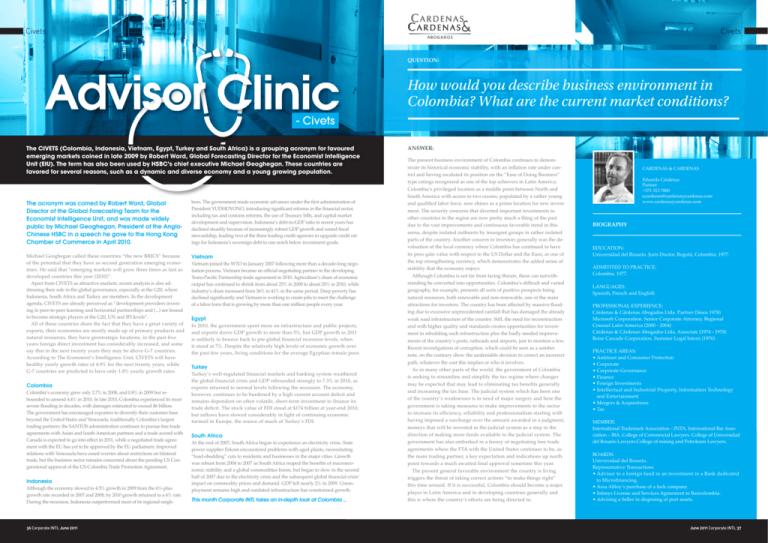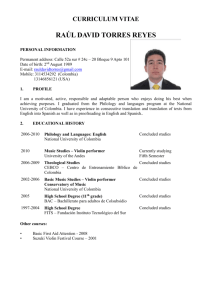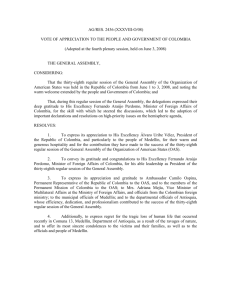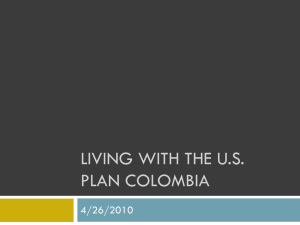How would you describe business environment in Colombia? What
advertisement

Sector Panel Civets Civets Sector Panel QUESTION: How would you describe business environment in Colombia? What are the current market conditions? - Civets The CIVETS (Colombia, Indonesia, Vietnam, Egypt, Turkey and South Africa) is a grouping acronym for favoured emerging markets coined in late 2009 by Robert Ward, Global Forecasting Director for the Economist Intelligence Unit (EIU). The term has also been used by HSBC’s chief executive Michael Geoghegan. These countries are favored for several reasons, such as a dynamic and diverse economy and a young growing population. The acronym was coined by Robert Ward, Global Director of the Global Forecasting Team for the Economist Intelligence Unit, and was made widely public by Michael Geoghegan, President of the AngloChinese HSBC in a speech he gave to the Hong Kong Chamber of Commerce in April 2010. bors. The government made economic advances under the first administration of President YUDHOYONO, introducing significant reforms in the financial sector, including tax and customs reforms, the use of Treasury bills, and capital market development and supervision. Indonesia’s debt-to-GDP ratio in recent years has declined steadily because of increasingly robust GDP growth and sound fiscal stewardship, leading two of the three leading credit agencies to upgrade credit ratings for Indonesia’s sovereign debt to one notch below investment grade. Michael Geoghegan called these countries “the new BRICS” because of the potential that they have as second generation emerging economies. He said that “emerging markets will grow three times as fast as developed countries this year (2010)”. Apart from CIVETS as attractive markets, recent analysis is also addressing their role in the global governance, especially at the G20, where Indonesia, South Africa and Turkey are members. In the development agenda, CIVETS are already perceived as “development providers investing in peer-to-peer learning and horizontal partnerships and (...) are bound to become strategic players at the G20, UN and IFI levels”. All of these countries share the fact that they have a great variety of exports, their economies are mostly made up of primary products and natural resources, they have geostrategic locations, in the past five years foreign direct investment has considerably increased, and some say that in the next twenty years they may be above G-7 countries. According to The Economist’s Intelligence Unit, CIVETS will have healthy yearly growth rates of 4.9% for the next twenty years, while G-7 countries are predicted to have only 1.8% yearly growth rates. Vietnam Colombia Colombia’s economy grew only 2.7% in 2008, and 0.8% in 2009 but rebounded to around 4.4% in 2010. In late 2010, Colombia experienced its most severe flooding in decades, with damages estimated to exceed $6 billion. The government has encouraged exporters to diversify their customer base beyond the United States and Venezuela, traditionally Colombia’s largest trading partners; the SANTOS administration continues to pursue free trade agreements with Asian and South American partners and a trade accord with Canada is expected to go into effect in 2011, while a negotiated trade agreement with the EU has yet to be approved by the EU parliament. Improved relations with Venezuela have eased worries about restrictions on bilateral trade, but the business sector remains concerned about the pending US Congressional approval of the US-Colombia Trade Promotion Agreement. Indonesia Although the economy slowed to 4.5% growth in 2009 from the 6%-plus growth rate recorded in 2007 and 2008, by 2010 growth returned to a 6% rate. During the recession, Indonesia outperformed most of its regional neigh- 36 Corporate INTL June 2011 Vietnam joined the WTO in January 2007 following more than a decade-long negotiation process. Vietnam became an official negotiating partner in the developing Trans-Pacific Partnership trade agreement in 2010. Agriculture’s share of economic output has continued to shrink from about 25% in 2000 to about 20% in 2010, while industry’s share increased from 36% to 41% in the same period. Deep poverty has declined significantly and Vietnam is working to create jobs to meet the challenge of a labor force that is growing by more than one million people every year. Egypt In 2010, the government spent more on infrastructure and public projects, and exports drove GDP growth to more than 5%, but GDP growth in 2011 is unlikely to bounce back to pre-global financial recession levels, when it stood at 7%. Despite the relatively high levels of economic growth over the past few years, living conditions for the average Egyptian remain poor. Turkey Turkey’s well-regulated financial markets and banking system weathered the global financial crisis and GDP rebounded strongly to 7.3% in 2010, as exports returned to normal levels following the recession. The economy, however, continues to be burdened by a high current account deficit and remains dependent on often volatile, short-term investment to finance its trade deficit. The stock value of FDI stood at $174 billion at year-end 2010, but inflows have slowed considerably in light of continuing economic turmoil in Europe, the source of much of Turkey’s FDI. South Africa At the end of 2007, South Africa began to experience an electricity crisis. State power supplier Eskom encountered problems with aged plants, necessitating “load-shedding” cuts to residents and businesses in the major cities. Growth was robust from 2004 to 2007 as South Africa reaped the benefits of macroeconomic stability and a global commodities boom, but began to slow in the second half of 2007 due to the electricity crisis and the subsequent global financial crisis’ impact on commodity prices and demand. GDP fell nearly 2% in 2009. Unemployment remains high and outdated infrastructure has constrained growth. This month Corporate INTL takes an in-depth look at Colombia … ANSWER: The present business environment of Colombia continues to demonstrate its historical economic stability, with an inflation rate under control and having escalated its position on the “Ease of Doing Business” type ratings recognized as one of the top achievers in Latin America. Colombia’s privileged location as a middle point between North and South America with access to two oceans, populated by a rather young and qualified labor force, now shines as a prime location for new investment. The security concerns that diverted important investments to other countries in the region are now pretty much a thing of the past due to the vast improvements and continuous favorable trend in this arena, despite isolated outbursts by insurgent groups in rather isolated parts of the country. Another concern to investors generally was the devaluation of the local currency where Colombia has continued to have its peso gain value with respect to the US Dollar and the Euro, as one of the top strengthening currency, which demonstrates the added sense of stability that the economy enjoys. Although Colombia is not far from facing threats, these can notwithstanding be converted into opportunities. Colombia’s difficult and varied geography, for example, presents all sorts of positive prospects being natural resources, both renewable and non-renewable, one of the main attractions for investors. The country has been affected by massive flooding due to excessive unprecedented rainfall that has damaged the already weak road infrastructure of the country. Still, the need for reconstruction and with higher quality and standards creates opportunities for investment in rebuilding such infrastructure plus the badly needed improvements of the country’s ports, railroads and airports, just to mention a few. Recent investigations of corruption, which could be seen as a somber note, on the contrary show the undeniable decision to correct an incorrect path, whatever the cost this implies or who it involves. As in many other parts of the world, the government of Colombia is seeking to streamline and simplify the tax regime where changes may be expected that may lead to eliminating tax benefits generally and increasing the tax base. The judicial system which has been one of the country’s weaknesses is in need of major surgery and here the government is taking measures to make improvements to the sector to increase its efficiency, reliability and professionalism starting with having imposed a surcharge over the amount awarded in a judgment, moneys that will be invested in the judicial system as a step in the direction of making more funds available to the judicial system. The government has also embarked in a frenzy of negotiating free trade agreements where the FTA with the United States continues to be, as the main trading partner, a key expectation and indications up north point towards a much awaited final approval sometime this year. The present general favorable environment the country is living triggers the threat of taking correct actions “to make things right” this time around. If it is successful, Colombia should become a major player in Latin America and in developing countries generally and this is where the country’s efforts are being directed to. CARDENAS & CARDENAS Eduardo Cárdenas Partner +571 313 7800 ecardenas@cardenasycardenas.com www.cardenasycardenas.com BIOGRAPHY EDUCATION: Universidad del Rosario. Juris Doctor. Bogotá, Colombia. 1977. ADMITITED TO PRACTICE: Colombia, 1977. LANGUAGES: Spanish, French and English PROFESSIONAL EXPERIENCE: Cárdenas & Cárdenas Abogados Ltda. Partner (Since 1978) Microsoft Corporation. Senior Corporate Attorney, Regional Counsel Latin America (2000 - 2004) Cárdenas & Cárdenas Abogados Ltda. Associate (1974 - 1978) Boise Cascade Corporation. Summer Legal Intern (1976) PRACTICE AREAS: • Antitrust and Consumer Protection • Corporate • Corporate Governance • Finance • Foreign Investments • Intellectual and Industrial Property, Information Technology and Entertainment • Mergers & Acquisitions • Tax MEMBER: International Trademark Association – INTA. International Bar Association – IBA. College of Commercial Lawyers. College of Universidad del Rosario Lawyers.College of mining and Petroleum Lawyers. BOARDS: Universidad del Rosario. Representative Transactions • Advisor to a foreign fund in an investment in a Bank dedicated to Microfinancing. • Assa Abloy’s purchase of a lock company. • Infosys License and Services Agreement to Bancolombia. • Advising a Seller in disposing of port assets. June 2011 Corporate INTL 37




